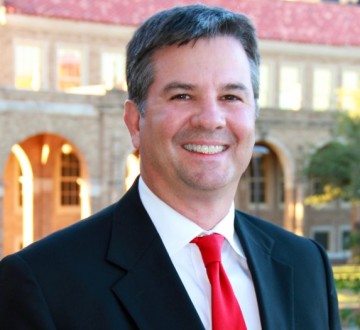
How Texas Politicians Bungle the Bible
Long before Jeff Sessions used Romans 13 to justify stripping children from their parents, it was already the go-to verse for Texas pols seeking to defend all sorts of questionable policies.

When the Apostle Paul wrote his letter to the Christians in Rome, he probably had no idea that one small section of it, Romans 13:1-5, would become the go-to biblical passage for right-wing politicians in the distant land of Texas in 2000 years or so.
But in recent months, conservative politicians have dusted off this passage for a mind-boggling range of purposes: fending off criticism, complaining about undocumented immigrants, even attacking the current Texas House speaker, Joe Straus. And some of these uses — or perhaps misuses — might surprise the apostle himself.
Hunt County Sheriff Randy Meeks drew national attention last year when he declared that law enforcement officers’ authority comes from God, and that if Black Lives Matter protesters don’t like that unassailable fact, they need to consult the Bible. Specifically? The book of Romans. Chapter 13.

In an ornery op-ed, written after the release of a video appearing to show one of Meeks’ deputies repeatedly punching a pregnant woman, Meeks complained that while vicious criminals are presumed innocent until proven guilty, “law enforcement officers are found guilty as soon as it ‘appears’ that the officer has done something wrong.”
In fact, the Hunt County deputy shown in the video was no-billed by a grand jury, but Meeks soldiered on.
“People evidently don’t want law and order,” he complained. “They want to kill, threaten and harm the very officers who are in place to protect them.” He topped this off by citing Romans 13: “Guess where that authority comes from to law enforcement? It comes from Romans 13:1 in the Bible. And while you are at it, you folks in Ferguson, Baltimore, Arlington and here, take a gander at Romans 13:2.”
When we do take a gander at those two verses, we find Paul counseling “every person [to] be subject to the governing authorities,” because those authorities have been instituted by God. “[W]hoever resists authority,” Paul writes, “resists what God has appointed, and those who resist will incur judgment.”
Paul wrote his letter at a time when power was “exercised by a few by right of birth, or connection, or wealth or ruthless self-advancement” — not in a modern democratic society in which citizens have a right to judge whether those in power are acting for their good, and kick them out of office if they aren’t.
Furthermore, as New Testament scholar James D. G. Dunn cautions, Paul wrote his letter at a time when power was “exercised by a few by right of birth, or connection, or wealth or ruthless self-advancement” — not in a modern democratic society in which citizens have a right to judge whether those in power are acting for their good, and kick them out of office if they aren’t. As Dunn writes, if a government is not “serving God for the good of its citizens,” defending it by appealing to Romans 13 distorts and abuses Paul’s purpose. Romans 13 doesn’t give officeholders a Get-Out-of-Public-Criticism-Free card.
Another questionable use of Romans 13 cropped up during the debate over Governor Greg Abbott’s decision to keep Syrian refugees out of Texas, which, as San Antonio Express-News’ Peggy Fikac reported, dismayed Texas faith groups. Bishops from the governor’s own Catholic Church called on him to follow another teaching from Paul’s letter: “extend hospitality to strangers.” Abbott told Fikac that the Bible also says that government’s role is “among other things, focused on protecting the safety and security of its people.” He underscored this with a November 2015 tweet: “Romans 13 teaches that Government’s role is different than man’s duty: it is to protect citizens & ensure justice. Texas will abide” (sic).
However, Romans 13 doesn’t say anything about government protecting citizens — only about serving the good and punishing wrongdoers. It certainly doesn’t advocate denying homes to refugees based solely on what country they’re fleeing from. Besides, Paul himself often depended on the kindness of strangers: For instance, when he was shipwrecked on the island of Malta, he says that the inhabitants treated him and his fellow passengers with “unusual kindness.”

Speaking of treatment of foreigners, Texas state Senator Charles Perry, R-Lubbock, made particularly creative use of that same passage when he spoke out against sanctuary cities — localities that do not enforce federal immigration policies — in a January 2016 hearing. After complaining about Texas’ “porous and open border,” Perry invoked Romans 13, saying, “The one thing that government is supposed to do is protect the good and punish the evil….We just want our laws enforced.”
In other words, government should force cities to go after undocumented immigrants. State Senator Eddie Lucio Jr., D-Brownsville, countered that the Bible justifies compassion toward immigrants: “I read the Bible quite a bit, and even the Messiah was an immigrant at some point.” Perry responded by reaching for Romans 13 again: “My Bible says government is on the shoulders of Christ.…The one thing that government is supposed to do is protect the good and punish the evil.”
Perry’s use of the passage is especially odd because the “evil” he has in mind seems to be undocumented immigrants and the cities that shelter them. Sure, those immigrants are breaking the law by living in the United States without authorization. But does that rise to the level of evil? Really? And given Paul’s own command to “extend hospitality to strangers,” it’s hard to imagine that he’d side with Perry on this.
However, the winner for the strangest use of Romans 13 has to be San Antonio tea party activist Jeff Judson. Whereas Meeks and Abbott used the passage to fend off criticism of their own offices, Judson used it to attack a current office-holder, Texas House Speaker Straus, R-San Antonio, whom Judson unsuccessfully opposed in the GOP primary.

In a campaign document chock full of scripture citations, laying out what he calls his “Biblical candidacy,” Judson writes: “As a Bible-believing Christian…I know that God created the institution of government to reward good and punish evil (Romans 13:1-4).” Judson mentions a host of evils — same-sex marriage, Planned Parenthood, sanctuary cities, even streetcars (!). But above all, as the Express-News’ Brian Chasnoff observed, the principal evil seems to be Straus himself, whom Judson accuses of taking “God-honoring, conservative legislation” and trying to “stab it in the heart.”
Since Paul advises obedience to those in power, it’s difficult to see how the Romans passage fits Judson’s wish to unseat the incumbent Straus. Clearly Judson doesn’t think Straus’ legislative record is consistent with Christian teaching. Yet the authorities in the apostle’s day were uniformly pagan and sometimes downright hostile to Christianity — and Paul counseled obedience to them anyway. Perhaps Romans 13 isn’t the best proof text for Judson’s “Biblical candidacy.”
It’s not surprising that Texas conservatives are all over the map in their use of Romans 13. Over the centuries, this passage, like many parts of the Bible, has been taken to mean all sorts of things: Martin Luther used it to condemn rebellion against the government, while anti-Nazi theologian Dietrich Bonhoeffer read it as allowing resistance against an ungodly state. As the saying goes, you can use the Bible to prove just about anything.
And that points up a danger for politicians seeking to bolster their own positions by citing Holy Writ. The Bible isn’t a conservative book or a liberal book. It’s open to multiple interpretations, sometimes diametrically opposing ones. When politicians hitch their political wagon to the Bible, they may be in for a very bumpy ride.
[Featured image of a political forum at North Texas’ Prestonwood Baptist Church by Christopher Hooks.]


